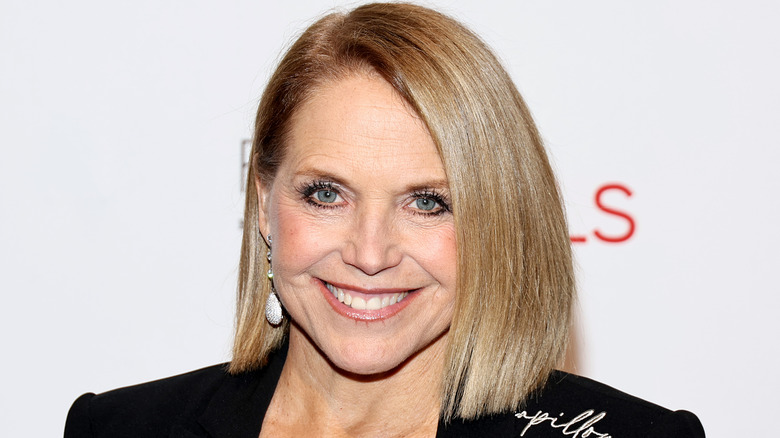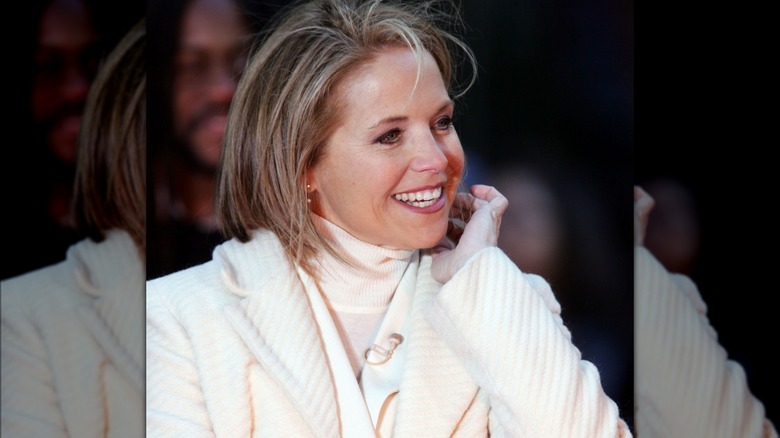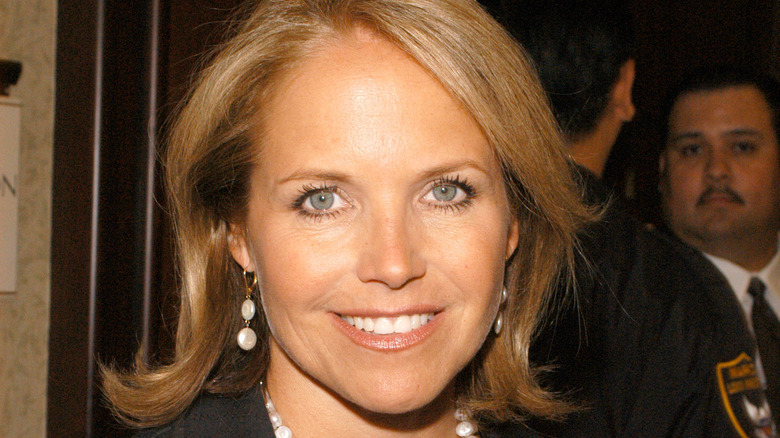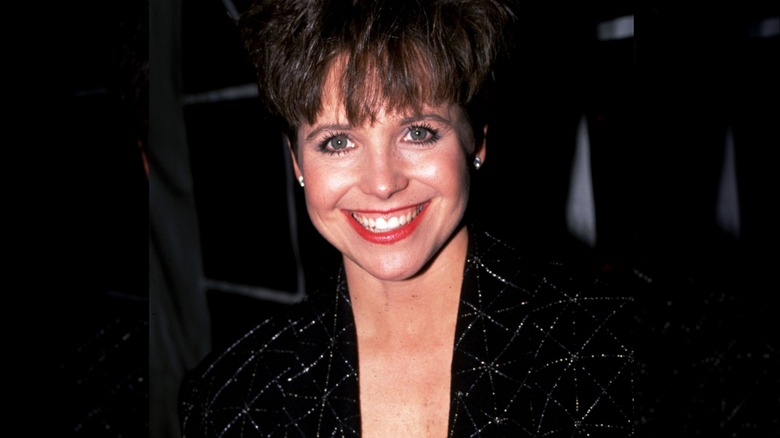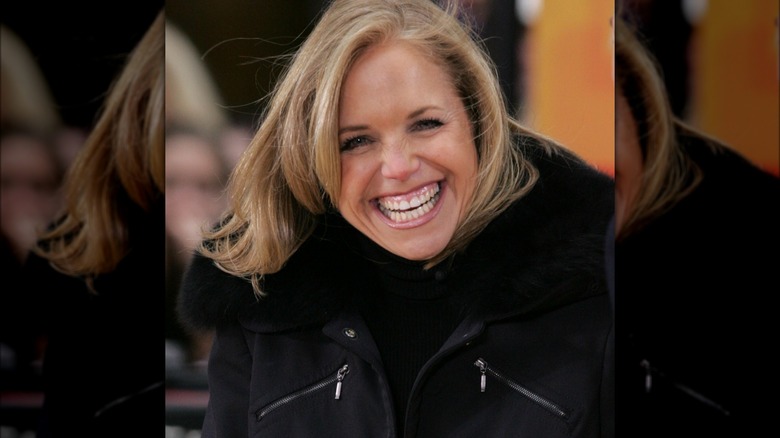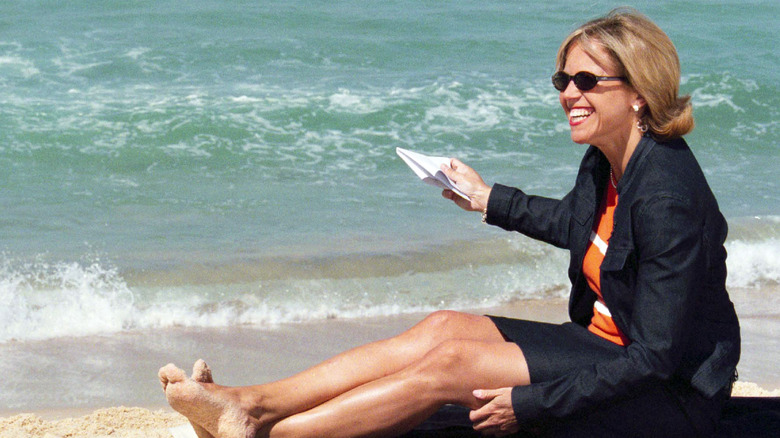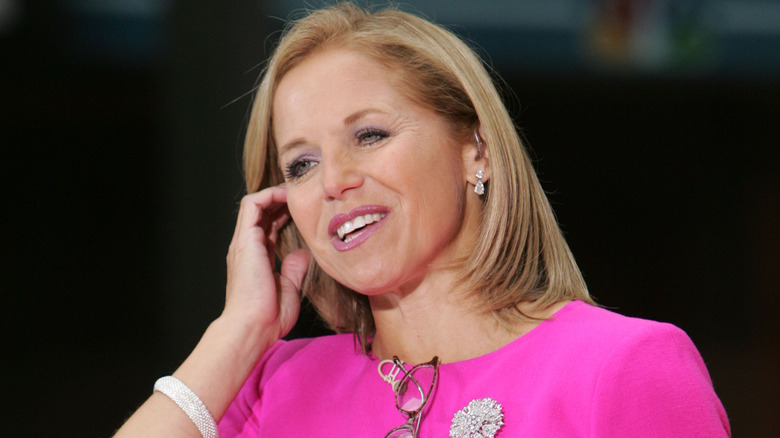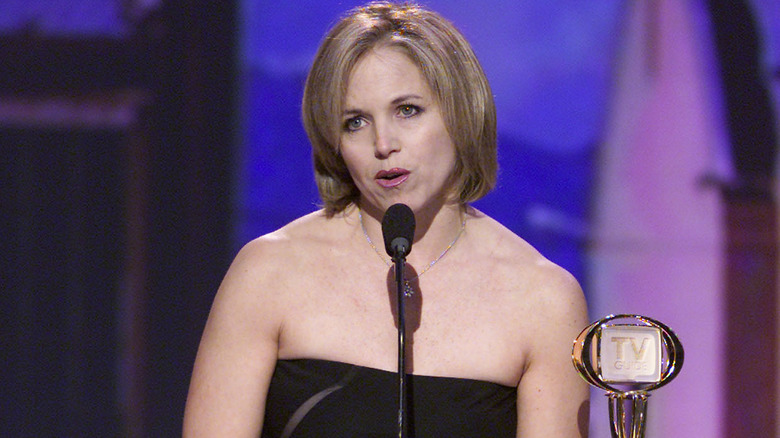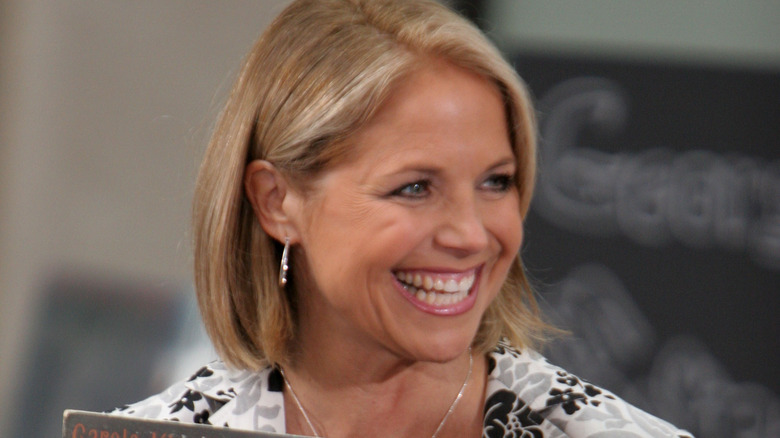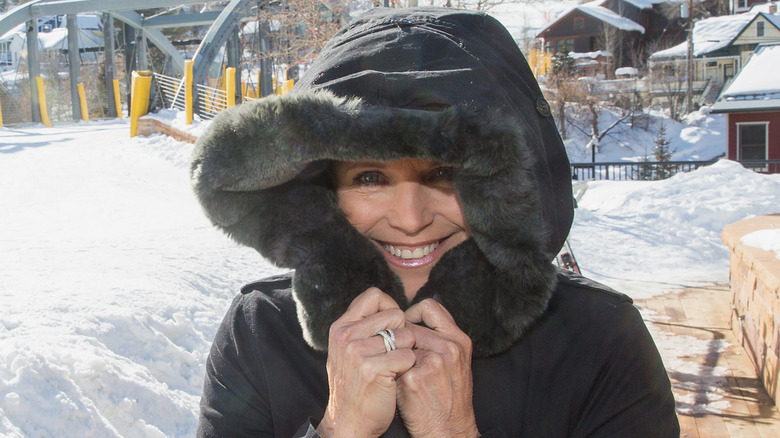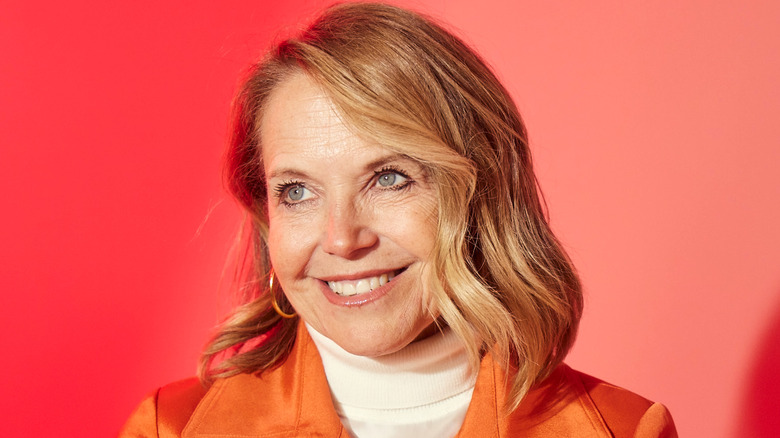Katie Couric's Unforgettable Moments In The Newsroom
Katie Couric is a media force to be reckoned with. She was the first woman to anchor a network evening news show on her own when she took over the "CBS Evening News" in 2006. With some of the most coveted journalist awards under her belt, like two Edward R. Murrow Awards, Couric is an absolute icon.
The news anchor has made a career of pushing boundaries and exceeding expectations, being especially competent at evolving with the times. She explained to Fast Company that it just comes with the territory given the flux nature of news media. "When you're a part of an established entity, there's so much incentive to maintain the status quo," she told the outlet. "A lot of times, the people who are leading are at the end of their careers, so they don't want to throw everything up and see where it lands. They want to make it someone else's problem." But even being told by an executive to stay off of X, formerly known as Twitter, wasn't going to stop Couric from being part of the media shift.
Couric's decades-long career has seen a lot of success, so that's why it's so difficult to parse Couric's career down to a short list of accomplishments. Her accolades and reporting are vast, but here's a list of her most unforgettable moments on air.
Katie Couric's departure from NBC
Before making history at CBS, Katie Couric's last day on NBC's "Today" after 15 years of serving as an anchor was an emotional one. Her expressive goodbye made it obvious how much she loved the work she did, and seeing someone so devoted to their craft saying goodbye gave viewers goosebumps. That episode was so well received that a poll by TiVo (via The Seattle Times) had voters dubbing it as the most memorable TV moment of the year for 2006.
"I wanted to leave on my own terms," Couric later explained in her 2021 memoir, "Going There." "Not because some TV executive decided I was no longer the flavor of the month. I wanted to jump before I got pushed."
The New York Times reported that the NBC higher-ups wanted Couric to break down during her departure, making her goodbye episode as sentimental as possible. However, Couric, a true master of her craft, kept her composure throughout the show that day, save for a couple of heartwarming tears. Even former weatherman Willard Scott showed up for the special day to sing to Couric. "You may have been a headache," Scott said. "But you never were a bore."
Her first day at CBS
We would be remiss not to include Katie Couric's first day in her historic position on the "CBS Evening News." As the first female solo anchor of a national evening news program, Couric set a precedent that by 2006 should hardly have been a historical day. Nonetheless, she faced it with grace in a way fitting with a career like hers. Couric kept her anchor gig with CBS from September 2006 until May 2011.
Despite the excitement around Couric's big debut, it ended up being a flash in the pan. Slate even referred to her central 10-minute Steve Irwin report as "fourth billing" against the other evening news shows that aired the same night on different channels. The outlet further noted that longer versions of Couric's reports were available on the CBS website, which was more remarkable than what had been presented on the TV show itself.
While it perhaps wasn't the fireworks the world was expecting, it was a major moment in Couric's stunning career and for aspiring female news anchors. She kept her anchor gig with CBS from September 2006 and ultimately leaving the position in May 2011.
She interviewed Anita Hill
When Anita Hill testified against Justice Clarence Thomas' appointment to the Supreme Court in 1991 due to his alleged sexual harassment of her, all eyes of the media were on her. But not many people were willing or able to speak to her. Alas, Katie Couric wanted to hear from Hill and give her a platform to reflect, even decades later. In part of her 1992 interview with Couric (via The New York Times), Hill said she was glad that her speaking up spurred more women to be politically active.
Speaking to People in 2019 about her favorite interviews from her career, Couric brought up her conversation with Hill. "I did one of the first interviews with Anita Hill and was so impressed that she came forward and testified on Capitol Hill," Couric told the outlet. "She has been such an important voice for women."
Couric interviewed Hill again in 2021 for the journalist's podcast, "Next Question." The two spoke about the ever-shifting landscape of the United States in the wake of the #MeToo movement versus when Hill came forward in 1991. "We have a long way to go," Hill told Couric on the podcast (via Couric's website). "Yet, I really am conceding that we have come far in 30 years."
Interviewing O.J. Simpson after his acquittal
In 1995, O.J. Simpson's not guilty verdict from the murder of his ex-wife Nicole Brown and Ronald Goldman was a heavily debated topic in households all over the United States. Following the trial, journalists were clamoring to cover it. Yet, that same year, Katie Couric and Tom Brokaw managed to arrange a no-holds-barred, exclusive interview with Simpson for NBC. Except the interview never happened; It was canceled by Simpson and his attorneys just days before it was supposed to air live.
But nearly a decade later in 2004, Couric finally got that interview with Simpson. This time the interview would be for NBC's "Dateline." The lengthy repartee included discussions of Simpson and Brown's children, his everyday life since the trial, and his relationship with Brown's family. She asked him specifically about financially compensating the victim's families, which got him heated; He even told her to stop asking about it.
Although Couric's segment was an exclusive and the first interview with Simpson for the 10th anniversary of the trial, but before Couric's segment went live, Fox News scooped her, according to The New York Times. The rival network managed to get comments from Simpson before Couric's interview aired. Even though Fox News beat NBC to the first punch, it was still a major interview for Couric's career.
Couric's on-air colonoscopy
Just a few years after tragically losing her husband, Jay Monahan, to colon cancer, Katie Couric made journalistic history by receiving a colonoscopy on "Today" in 2000. Doing so not only highlighted the importance of preventative testing but also encouraged tons of viewers to get the procedure done as well. According to a study published by the National Library of Medicine, the number of colonoscopies performed in the U.S. after Couric's on-air procedure increased. It was so significant that folks started calling it "the Katie Couric effect."
On the day of the segment airing, "Today" executive producer Jeff Zucker told The Washington Post of the procedure's importance. "We're showing it to demonstrate that there's no reason people should be scared," Zucker explained to the outlet. "We try to do it with tremendous sensitivity. We don't show a lot of her colon. We're not going to gross anybody out." The colonoscopy segment spanned over two episodes with a dedicated colon cancer series throughout the week.
"I think people feel uncomfortable discussing their colons, their rectums, their plumbing," Couric posited on a "Today" episode (via The Washington Post). "We have three words: Get over it. We don't want people to die of embarrassment."
Couric's devotion to covering colon cancer
Katie Couric's "Confronting Colon Cancer" coverage five-part series won her a Peabody Award in 2000, but, more importantly, extensively covered an important issue. After her husband Jay Monahan died from colon cancer in 1998, this investigative series became one of the most important reports of her career.
"My decision to become an advocate for colon cancer awareness and prevention seemed perfectly logical — over 6.3 million people watch the 'Today' show every day — to not use it as a bully pulpit to impart potentially life-saving information seemed to me then and now tantamount to criminal negligence," she wrote for Today. Couric further highlighted how colon cancer is curable about 90% of the time if it's caught early. She also discussed her co-creation of the National Colorectal Cancer Research Alliance alongside the Entertainment Industry Foundation.
With respect to her work, the Peabody Awards called Couric's series "exceptional public service journalism." The awarding body also recognized that the series was created with grace and educational value in mind.
Her coverage of 9/11
Everyone who was alive at the time remembers where they were on September 11, 2001, when the U.S. was attacked by terrorist plane hijackers. Katie Couric was live on the air when the planes hit the Twin Towers on 9/11. Pivoting coverage on a pin, Couric began reporting the events live as they unfolded.
On that chaotic and scary day, Couric even managed to do one of the first eyewitness interviews that would go on to expand our understanding of the tragedy. According to a 20th-anniversary piece by the eyewitness, Jennifer Oberstein, on Couric's website, Couric and co-host Matt Lauer interviewed Oberstein to confirm what was happening on the ground. She was even on the phone with the anchors when the second plane hit.
Reflecting on the day in 2011 in an essay for ABC News, Couric recalled not totally understanding the gravity of the situation at first. "'Oh my God,' I thought, 'Some pilot flying a small plane must have had a heart attack,'" Couric wrote. She further recalled that the rest of the day felt more like a movie rather than reality.
Covering Hurricane Katrina from New Orleans
For many journalists, there can be a pull to be on location during a major event to capture what is happening and inform the world. That must have been one of the realities for Katie Couric when she decided to fly to New Orleans to cover the devastation of Hurricane Katrina on the ground in 2005.
Looking back on the coverage, Couric wrote about her viewpoints as a reporter in a segment that didn't get published in her memoir. "As a reporter, I always loved being out in the field, telling personal stories that would make viewers and readers care — exposing the incompetence of both the local and federal government," she wrote (via her website). "But what I experienced in New Orleans was something I never could've prepared for." She went on to discuss how Hurricane Katrina was different from other hurricanes she had covered in her career. "The hurricane itself wasn't the problem," she recalled. "It was the fact that the levees in New Orleans had been breached, and the Crescent City was underwater."
Couric further highlighted how New Orleans fought hard to get back on its feet a decade later. In a piece for Yahoo in 2015, Couric examined how recovery further divided the city based on class and race and where residents could go from there.
She interviewed the women of SCOTUS
Although on separate occasions, Katie Couric called interviewing Supreme Court Justices Sandra Day O'Connor, Sonia Sotomayor, and Ruth Bader Ginsburg some of the most impactful moments of her career, per her 2019 interview with People. "What's most interesting about all of them is what were the influences that led them down this path — they all come from pretty humble beginnings, whether it's a cattle ranch in Arizona for Sandra Day O'Connor or Sonia Sotomayor from the Puerto Rican communities in the Bronx," she told People. "I always want to know what shaped them."
However, upon the release of her 2021 memoir, "Going There," Couric received backlash from what she wrote about negating some of the comments Ginsburg made in their 2016 interview about NFL players taking a knee during the National Anthem, according to NPR. Specifically, Ginsburg's answers focused on how the players, like Colin Kaepernick's ancestors, benefitted from the American government. Intentionally leaving out some of Ginsburg's commentary was viewed as unethical from a journalistic perspective. Couric later said on "Today" that she should have done a follow-up question or just let the piece run with the added answers.
Announcing her breast cancer diagnosis
With her deeply personal coverage of colon cancer awareness, Katie Couric's own bout with cancer was dealt with just as transparently. In an exclusive piece written for her website in 2022, Couric described how she found out she had breast cancer and the steps she took from there. Like in her colon cancer advocacy, Couric has made it a point to emphasize the importance of breast cancer screenings.
Couric openly discussed her lumpectomy, her family history of various lost (and won) cancer battles, and how she broke her news to the kids. "They'd already lost one parent," she wrote on her site in reference to her first husband Jay, who died at the age of 42. "The idea of losing another was unfathomable." For Breast Cancer Awareness Month in 2022, she posted a photo of her with her two daughters Ellie and Carrie on Instagram as her inspiration to stay well.
In 2023, Couric updated the public, saying her treatment was going well, with much thanks going to receiving regular breast cancer screenings. "I was very fortunate," the journalist explained to People. "My cancer was caught very, very early when it's most treatable, and if I can just be an advertisement for people to get screened, to get their mammography done, to talk to their doctors, and if they have dense breasts, to get additional screening."

